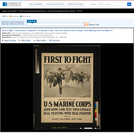
Poster showing marines storming a beach. Title from item.
- Subject:
- History
- U.S. History
- Material Type:
- Diagram/Illustration
- Primary Source
- Provider:
- Library of Congress
- Provider Set:
- Library of Congress - World War I Posters
- Date Added:
- 06/18/2013

Poster showing marines storming a beach. Title from item.
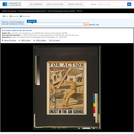
U.S. Army Air Service recruiting poster showing man cranking on airplane propeller.
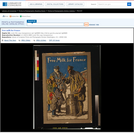
Poster showing a soldier ladling out milk for children.
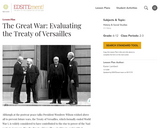
Was the Treaty of Versailles, which formally concluded World War I, a legitimate attempt by the victorious powers to prevent further conflict, or did it place an unfair burden on Germany? This lesson helps students respond to the question in an informed manner. Activities involve primary sources, maps, and other supporting documents related to the peace process and its reception by the German public and German politicians.
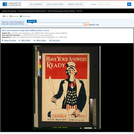
Poster showing Uncle Sam about to write with a quill pen in a book labelled "census." Forms part of: Willard and Dorothy Straight Collection.
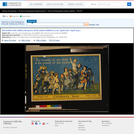
Poster showing a group of happy children on a hill. United States Children's Bureau and Woman's Committee of the Council of National Defense. Committee on Public Information, Division of Pictorial Publicity.
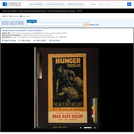
Poster showing a woman and children, cowering in distress. 937 Woodward Building, campaign headquarters, Near East Relief, 819 15th Street.
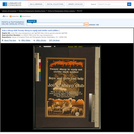
A civilian propaganda poster showing boys and girls raising sheep, above them are sheep walking along a roadway that leads to the top of the poster where a battle is underway. Caption continues: Write to-day for full information to your County Agent or Club Leader or State Director of Extension State Agricultural College.
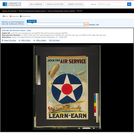
Poster showing soldiers, airplanes, and airships around star insignia.
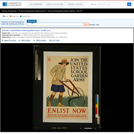
Poster showing a girl plowing. Text continues: Write to The United States School Garden Army, Bureau of Education, Department of Interior, Washington, D.C. Exhibited: American Treasures of the Library of Congress, 2003.
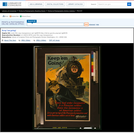
Poster showing a German soldier fleeing from an oncoming locomotive bearing insignia, "U.S." "Every bad order locomotive is a Prussian soldier. Every live locomotive is an American soldier. Let us get on top of the Prussian locomotives and make American soldiers out of them." W.G. McAdoo, Director General of Railroads.
!["The Last Evidence That Anybody Cares" Says a Soldier "over there" of the Y.M.C.A. Dugout the Y.M.C.A. is Our Boys' "Big Brother" [...] What Will You Give to Show them That Somebody Cares - That You Care?/](https://img.oercommons.org/160x134/oercommons/media/upload/materials/screenshots/materials-course-92518.png)
Poster showing soldiers gathering at a Y.M.C.A. dugout canteen. National War Work Council of the Young Men's Christian Associations of the United States. Forms part of: Willard and Dorothy Straight Collection.
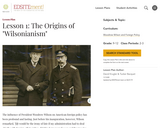
The influence of President Woodrow Wilson on American foreign policy has been profound and lasting. Using a variety of primary sources, students analyze the origins of the ambitious foreign policy that came to be known as Wilsonianism and compare it with important alternative traditions in American foreign policy.
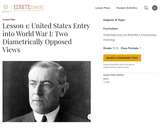
American foreign policy continues to resonate with the issues involved in the entry of the United States into World War I"”unilateralism versus foreign alliances, the responsibilities of power, the influence of the military-industrial complex on foreign policy, the use of force to accomplish idealistic goals. Understanding the choices the Wilson administration made and their consequences provides insight into international affairs in the years since the end of the Great War and beyond. In this lesson, students reconsider the events leading to U.S. entry into World War I through the lens of archival documents.
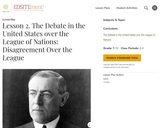
American foreign policy debate over U.S. entry into the League of Nations-collective security versus national sovereignty, idealism versus pragmatism, the responsibilities of powerful nations, the use of force to accomplish idealistic goals, the idea of America. Understanding the debate over the League and the consequences of its failure provides insight into international affairs in the years since Great War. In this lesson, students read the words and listen to the voices of some central participants in the debate over the League of Nations.
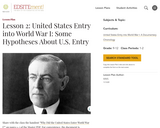
What is the most compelling evidence explaining why the U.S. entered World War I? After completing the lessons in this unit, students will be able to: Take a stand on a hypothesis for U.S. entry into World War I, supported by specific evidence.
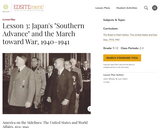
For the Japanese leadership, events in Europe during the first half of 1940 offered new opportunities for resolving the war in China. In this lesson students will examine primary documents and maps to discover why Japan embarked on its "southern advance."
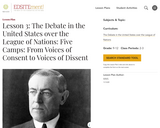
American foreign resonates with the debate over U.S. entry into the League of Nations-collective security versus national sovereignty, idealism versus pragmatism, the responsibilities of powerful nations, the use of force to accomplish idealistic goals, the idea of America. Understanding the debate over the League and the consequences of its failure provides insight into international affairs in the years since the Great War and beyond. In this lesson, students read the words and listen to the voices of some central participants in the debate over the League of Nations.
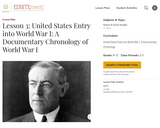
In this lesson of the curriculum unit, students reconsider the events leading to U.S. entry into World War I through the lens of archival documents.
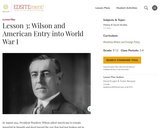
In August 1914, President Woodrow Wilson asked Americans to remain impartial in thought and deed toward the war that had just broken out in Europe. For almost three years, the President presided over a difficult, deteriorating neutrality, until finally the provocations could no longer be ignored or negotiated. In this lesson, students analyze one of the most significant moments in twentieth century U.S. foreign relations: Wilson's decision to enter World War I in order to make the world "safe for democracy."